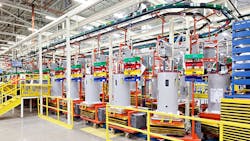Despite Lean Start, GE Appliances to End Production of GeoSpring Water Heater
In 2012 General Electric's Appliance Park celebrated with great fanfare the opening of the first new manufacturing operation at the Louisville, Ky., site in more than 50 years. At the time, the introduction of lean manufacturing, as well as a more competitive wage structure, was cited as key to bringing production of GE's GeoSpring electric hybrid water heater back to the United States and Appliance Park. An earlier version of the heater had been produced in Asia.
GE Appliances, now owned by China's Qingdao Haier Co. Ltd., has announced it will stop making the GeoSpring water heater at the end of the year. Demand for the energy-efficient water heaters never materialized to expected levels, according to a company news release.
"Consumers’ incentive for paying higher upfront product acquisition costs for the high-technology, energy-efficient heat pump water heaters has declined as energy costs have dropped," the release said.
It also noted that each of the company's product lines, plants and other operations must continuously improve to compete with operations both inside and outside of GE Appliances.
"This is especially important as the business continues to transition to a stand-alone company solely responsible for generating the funding to run the business and continue to invest in growth," the release said. GE completed the sale of its appliances business to Haier in June.
Built on Lean
The GeoSpring electric hybrid water heater was the first appliance product line GE developed using lean principles from the start, GE Appliances said at the product line's launch. The lean approach helped the company eliminate 20% of the parts used in GeoSpring final assembly, cut program cycle time in half and reduced equipment investment by 30%.
The 100 employees working on the GeoSpring line are expected to fill vacant positions elsewhere in Appliance Park once production concludes.
In a separate action, GE Appliances also reported it would outsource warehouse operations at Appliance Park to a third-party in early 2017. Approximately 200 hourly workers are impacted. They, too, are expected to transition to fill vacant positions created by attrition.
About the Author
Jill Jusko
Bio: Jill Jusko is executive editor for IndustryWeek. She has been writing about manufacturing operations leadership for more than 20 years. Her coverage spotlights companies that are in pursuit of world-class results in quality, productivity, cost and other benchmarks by implementing the latest continuous improvement and lean/Six-Sigma strategies. Jill also coordinates IndustryWeek’s Best Plants Awards Program, which annually salutes the leading manufacturing facilities in North America.
Have a story idea? Send it to [email protected].

